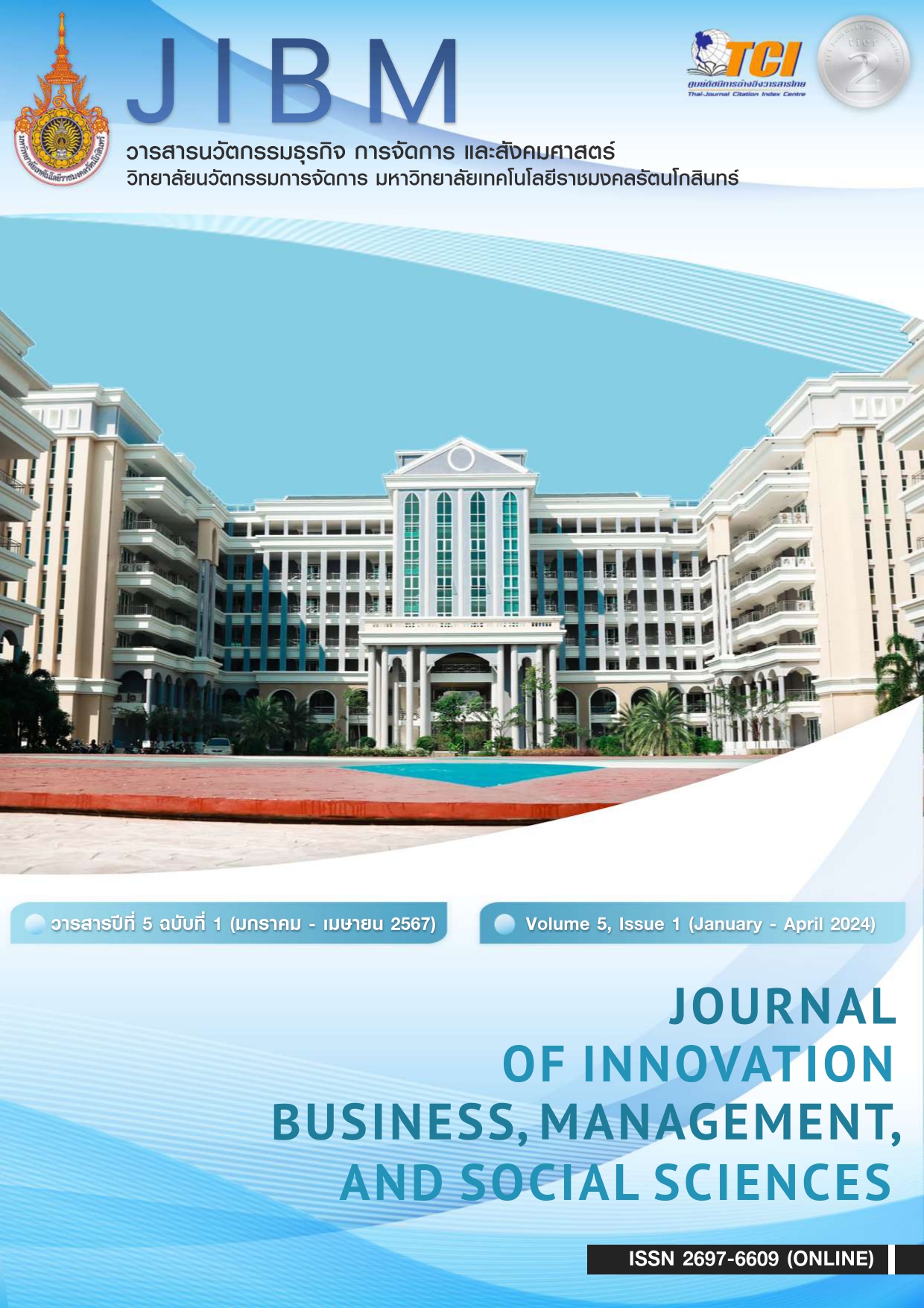การเปิดเผยข้อมูลจำนวนโครงการลดก๊าซเรือนกระจกภาคสมัครใจตามมาตรฐาน ของประเทศไทยและมูลค่าเงินลงทุนที่มีอิทธิพลต่อผลตอบแทนจากการลงทุน ของบริษัทที่ได้รับการขึ้นทะเบียนกับองค์การบริหารจัดการก๊าซเรือนกระจก (องค์การมหาชน)
คำสำคัญ:
โครงการ T-VER , มูลค่าเงินลงทุน , อัตราผลตอบแทนจากการลงทุน (ROI)บทคัดย่อ
การวิจัยครั้งนี้มีวัตถุประสงค์เพื่อศึกษาอิทธิพลของการเปิดเผยข้อมูลจำนวนโครงการลดก๊าซเรือนกระจกภาคสมัครใจตามมาตรฐานของประเทศไทย และมูลค่าเงินลงทุนของบริษัทที่ได้รับการขึ้นทะเบียนกับองค์การบริหารจัดการก๊าซเรือนกระจก (องค์การมหาชน) ที่มีอิทธิพลต่ออัตราผลตอบแทนจากการลงทุน (ROI) ของบริษัทที่ได้รับการขึ้นทะเบียนกับองค์การบริหารจัดการก๊าซเรือนกระจก (องค์การมหาชน) จำนวน 48 บริษัท ในปี พ.ศ. 2563 และ พ.ศ. 2565 และจำนวน 49 บริษัท ในปี พ.ศ. 2564 การเก็บรวบรวมข้อมูลทำการเก็บจากรายงานประจำปีในรอบระยะเวลาบัญชี และรายงานขององค์การบริหารจัดการก๊าซเรือนกระจก (องค์การมหาชน) พ.ศ. 2563 - 2565 สถิติในการวิจัยครั้งนี้คือการวิเคราะห์ความถดถอยเชิงพหุคูณ (Multiple Regression Analysis) เพื่อทดสอบอิทธิพลระหว่างตัวแปร ผลการวิจัยพบว่าการเปิดเผยข้อมูลจำนวนโครงการลดก๊าซเรือนกระจกภาคสมัครใจตามมาตรฐานของประเทศไทย (T-VER) มีอิทธิพลในทิศทางบวกต่ออัตราผลตอบแทนจากการลงทุน (ROI) อย่างมีนัยสำคัญที่ระดับนัยสำคัญ .01 ในขณะที่มูลค่าเงินลงทุนในโครงการลดก๊าซเรือนกระจกภาคสมัครใจตามมาตรฐานของประเทศไทย (IV) มีอิทธิพลในทิศทางลบต่ออัตราผลตอบแทนจากการลงทุน (ROI) อย่างมีนัยสำคัญที่ระดับนัยสำคัญ .01 ตลอด 3 ปีที่ทำการศึกษาวิจัย การวิจัยในครั้งนี้จึงสามารถใช้ข้อมูลเพื่อ สนับสนุนแนวทางการกำหนดนโยบายของบริษัทได้ว่า หากบริษัทต่าง ๆ ดำเนินโครงการลดก๊าซเรือนกระจกภาคสมัครใจตามมาตรฐานของประเทศไทย T-VER จะสามารถสะท้อนไปถึงผลตอบแทนจากการลงทุนได้
เอกสารอ้างอิง
กรมสรรพากร. (2566). กรมสรรพากร. สืบค้นจาก: https://www.rd.go.th/1603.html.
ดารารัตน์ โพธิ์ประจักษ์, ชนาเมธ น้อยอ่าง, และอุภาวดี เนื่องวรรณะ. (2566). การสังเคราะห์โมเดลสมการโครงสร้างการเปิดเผยข้อมูลการพัฒนาที่ยั่งยืนที่ส่งผลต่อมูลค่ากิจการผ่านความเข้มแข็งทางการเงินของบริษัทที่จดทะเบียนในตลาดหลักทรัพย์แห่งประเทศไทย กลุ่มเกษตรและอุตสาหกรรมอาหาร กลุ่มบริการและกลุ่มสินค้าอุปโภคบริโภค ภายใต้วิกฤตการณ์การแพร่ระบาดของเชื้อไวรัสโคโรนา 2019. วารสารนวัตกรรมธุรกิจ การจัดการ และสังคมศาสตร์, 4(1), 42-59.
ตลาดหลักทรัพย์แห่งประเทศไทย. (2565). สรุปจำนวนหลักทรัพย์และบริษัทจดทะเบียน. สืบค้นจาก: https://www.set.or.th/set/marketstatistics.do.
เนติวรรณ ดวงศรี, เกรียงศักดิ์ โชติจรุงเกียรติ์, จีระศักดิ์ ดิษฐพลขันธ์, ธิติ เตชะไพโรจน์, และจุฑามาศ นันทโพธิเดช. (2564). ปัญหากฎหมายเกี่ยวกับการซื้อขายคาร์บอนเครดิตในประเทศไทย. วารสารมนุษยศาสตร์และสังคมศาสตร์ มหาวิทยาลัยราชภัฏอุดรธานี, 10(1), 145-158.
Ganda, F., & Milondzo, K. S. (2018). The Impact of carbon emissions on corporate financial performance: Evidence from the South African Firms. Sustainability, 10(7), 2-22.
Thuan, L. D., Minh, M. T. H., & Huy, P. Q. (2024). Impact of social responsibility disclosure between implementations of environmental accounting, green HRM, energy efficiency, and sustainable development: A study of Vietnam. Cuadernos de Economía, 47(133), 43-53.
Phoprachak, D. (2018). Influence of firm size on cost of capital through corporate Social responsibility disclosure of the listed companies in the Stock Exchange of Thailand. PSAKU International Journal of Interdisciplinary Research, 7(8), 171-181.
Smale, R., Hartley, M., Hepburn, C., Ward, J., & Grubb, M. (2012). The impact of CO2 emissions trading on firm profits and market prices. In Emissions Trading and Competitiveness (pp. 31-48). Routledge.
Saeidi, S. P., Sofian, S., Saeidi, P., Saeidi, S. P., & Saaeidi, S. A. (2015). How does corporate social responsibility contribute to firm financial performance? The mediating role of competitive advantage, reputation, and customer satisfaction. Journal of Business Research, 68(2), 341-350.



